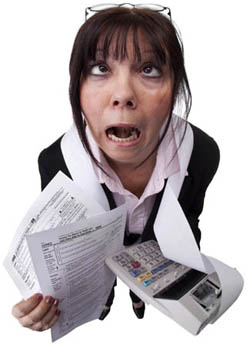 In the latest in a series of interviews with local small business experts, I spoke with Victoria Brush E.A., who runs a tax and accounting practice here in Park Slope, Brooklyn NY (www.BrushTax.com ) Here are some highlights from our conversation on accounting, bookkeeping tips and some good reasons NOT to do DIY accounting:
In the latest in a series of interviews with local small business experts, I spoke with Victoria Brush E.A., who runs a tax and accounting practice here in Park Slope, Brooklyn NY (www.BrushTax.com ) Here are some highlights from our conversation on accounting, bookkeeping tips and some good reasons NOT to do DIY accounting:
Before going into business for yourself, speak with an accountant or a good business attorney who can give you the correct advice before starting your business. Spending a couple of hundred dollars up front can save you time, money and hassle down the road.
People often get themselves into trouble because they think the legal websites that allow them to form business entities by themselves look so easy. Resist the temptation to do this! For instance, let’s say you’re thinking of starting an LLC and you mention this to a friend, who suggests that you put your spouse on the LLC as well, just in case you get sick and need someone to run the business for you. You think it’s a great idea, and run to one of the legal websites to do it. This doesn’t turn out well, since you now have a two member LLC which means you MUST file a partnership return and can’t disregard it for tax purposes. But you don’t realize this, so you don’t file taxes the first year because you haven’t done much business, but then find out 1 ½ years down the road that you owe $350 (IRS and NY State) a month in penalties for not filing! Now perhaps a good accountant can get some of the penalties reversed, but it will cost you to have them clean up the mess.
Once you setup a business entity, USE IT. Don’t set it aside and continue to pay people out of your personal bank account. You have no legal protection unless you’re actually doing business as the entity.
Keeping up with your financial records on a monthly basis is very important. The more often you keep up with it, the easier it is to remember what’s what, and you have information to work with that’s current. It’s hard to run a business if you have no idea what’s going on financially. Learn how to read financial statements and do so on a regular basis. Pay attention to the numbers so you’ll really know what’s going on. It’s easy for your finances to get out of control, so please attend to them often!
If you want to get a line of credit or overdraft protection, you won’t be able to apply without a good set of books.
If you’re doing your own books, please stop. Don’t think that merely buying a copy of Quickbooks or some other bookkeeping software will instantly turn you into a bookkeeper. In fact, Victoria and I have both known numerous business owners who have gotten themselves into some expensive trouble doing their own bookkeeping.
More accounting bookkeeping tips: Victoria urges you to make sure to do proper, basic record-keeping. Don’t think that the record of a purchase on a debit or credit card statement substitutes for a receipt. It won’t tell you what you actually spent the money on, and you can’t just “make up” what expenses are for. Also, please keep receipts for all amounts, even if they’re under $75. Also keep copies of all checks you deposit into your account. You must know where deposits are coming from. If you can’t identify where money is coming from, even if it’s a capital contribution, the government with consider it income. Make sure to annotate your deposit slips and keep copies of them so that you can always tell where funds are coming from and why you received them.
